
Lionel Barrymore was an American actor of stage, screen and radio as well as a film director. He won an Academy Award for Best Actor for his performance in A Free Soul (1931) and is known to modern audiences for the role of villainous Mr. Potter in Frank Capra's 1946 film It's a Wonderful Life.
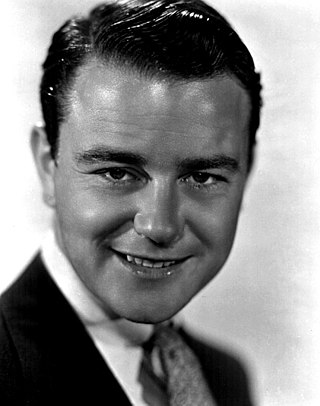
Lewis Frederick Ayres III was an American actor whose film and television career spanned 65 years. He is best known for starring as German soldier Paul Bäumer in the film All Quiet on the Western Front (1930) and for playing Dr. Kildare in nine films. He was nominated for an Academy Award for Best Actor for his performance in Johnny Belinda (1948).

Dr. James Kildare is a fictional American medical doctor, originally created in the 1930s by the author Frederick Schiller Faust under the pen name Max Brand. Shortly after the character's first appearance in a magazine story, Paramount Pictures used the story and character as the basis for the 1937 film Internes Can't Take Money, starring Joel McCrea as Jimmie Kildare. Metro-Goldwyn-Mayer (MGM) subsequently acquired the rights and featured Kildare as the primary character in a series of American theatrical films in the late 1930s and early 1940s. Several of these films were co-written by Faust, who also continued to write magazine stories and novels about the character until the early 1940s. Kildare was portrayed by Lew Ayres in nine MGM films. Later films set in the same hospital featured Dr. Gillespie. Ayres returned to voice the Kildare character in an early 1950s radio series. The 1961–1966 Dr. Kildare television series made a star of Richard Chamberlain and gave birth to a comic book and comic strip based on the show. A short-lived reboot of the TV series, Young Doctor Kildare, debuted in 1972 and ran for 24 episodes.

Internes Can't Take Money is a 1937 American drama film directed by Alfred Santell and starring Barbara Stanwyck, Joel McCrea, Lloyd Nolan and Stanley Ridges. McCrea portrays Dr. Kildare in the character's first screen appearance. Metro-Goldwyn-Mayer continued the Dr. Kildare series with Young Dr. Kildare (1938) starring Lew Ayres as Kildare and Laraine Day as a nurse in love with Kildare. The film was released in the United Kingdom as You Can't Take Money.
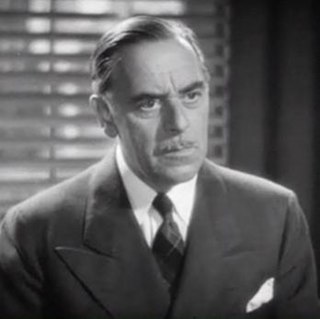
Walter Kingsford was an English stage, film, and television actor.
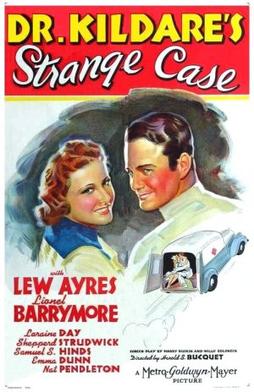
Dr. Kildare's Strange Case is a 1940 American drama film directed by Harold S. Bucquet. This was the fifth of a total of ten Dr. Kildare pictures. Horace MacMahon joined the cast regulars in the series as taxi driver "Foghorn" Murphy.
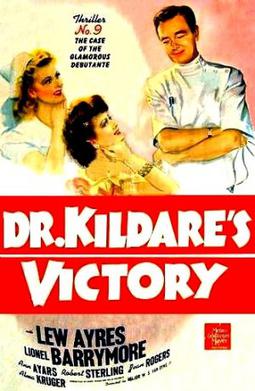
Dr. Kildare's Victory is a 1942 film directed by W. S. Van Dyke. It stars Lew Ayres and Lionel Barrymore. It is the ninth and last of the MGM Dr. Kildare movie series.
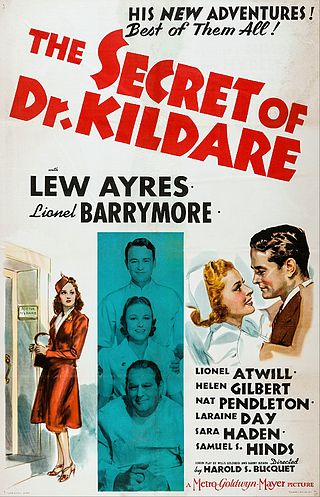
The Secret of Dr. Kildare is a 1939 American film directed by Harold S. Bucquet and produced by Metro-Goldwyn-Mayer. This was the fourth of a total of ten Dr. Kildare pictures, Lew Ayres starred all but the first.

Dr. Kildare Goes Home is a 1940 American drama film directed by Harold S. Bucquet, starring Lew Ayres, Lionel Barrymore and Laraine Day. It is the fifth in the MGM series of nine films with Lew Ayres as Dr. Kildare made from 1938–1942.
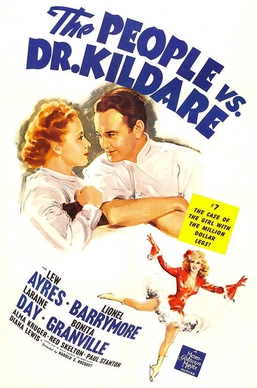
The People vs. Dr. Kildare is a 1941 American drama film directed by Harold S. Bucquet and starring Lew Ayres, Lionel Barrymore, Bonita Granville, and Laraine Day. It was part of the series of Doctor Kildare films produced by Metro-Goldwyn-Mayer. Kildare performs an emergency operation on a crash victim.
Dr. Gillespie's New Assistant is a 1942 feature film from MGM in their long-running Dr. Kildare series. Directed by Willis Goldbeck, it introduced two new doctors, Dr. Randall Adams and Dr. Lee Wong How.

Dr. Kildare's Crisis is a 1940 drama film directed by Harold S. Bucquet, starring Lew Ayres, Lionel Barrymore and Laraine Day. Mary Lamont's financier brother Douglas Lamont is subject to seizures, and it seems that he is suffering from hereditary epilepsy.
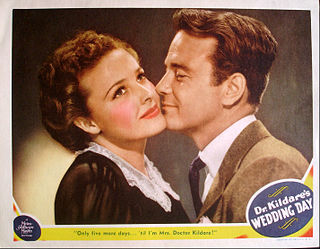
Dr. Kildare's Wedding Day is a 1941 American drama film directed by Harold S. Bucquet and starring Lew Ayres, Lionel Barrymore, and Laraine Day. It is the eighth of a total of nine Dr. Kildare pictures made by the Metro-Goldwyn-Mayer. When MGM decided to move up-and-coming star Laraine Day out of the "Dr. Kildare" series, the studio did so in a startlingly dramatic fashion. Adding extra interest to this film in the Kildare series, Barrymore composed the music credited to the Cornelia Bartlett character, and actor Red Skelton provides comic relief.

Calling Dr. Gillespie is a 1942 drama film directed by Harold S. Bucquet, starring Lionel Barrymore, Donna Reed and Philip Dorn. This was a continuation of the series that had starred Lew Ayres as Dr. Kildare. Ayres, however, had declared conscientious objector status to World War II, and was taken off the film. Kildare's mentor, Dr. Gillespie, portrayed here and in earlier films by Barrymore, became the lead character. In this first Kildare-less entry, Gillespie has a new assistant, refugee Dutch surgeon Dr. John Hunter Gerniede.

Calling Dr. Kildare is a 1939 film in the Dr. Kildare series. Directed by Harold S. Bucquet, it stars Lew Ayres as the young Dr. Kildare and Lionel Barrymore as Dr. Gillespie, his mentor. The second of MGM's series of Kildare films, it introduces Laraine Day as nurse Mary Lamont, the love of Kildare's life.

Dark Delusion is a 1947 American drama film directed by Willis Goldbeck and starring James Craig, Lionel Barrymore, and Lucille Bremer. Produced and released by Metro-Goldwyn-Mayer, it was the last film in the Dr. Kildare film series which stretched back to 1937.
Dr. Gillespie's Criminal Case is a 1943 film in the Dr. Kildare series. Based on characters created by Max Brand. The third of MGM's Dr. Gillespie series to dispense with the services of Dr. Kildare after Dr. Kildare's Victory (1942).

Between Two Women, made in 1945, was the sixteenth film in the Dr. Kildare series. It was the fourteenth of fifteen in which Lionel Barrymore starred as Dr. Leonard B. Gillespie. The film following was Dark Delusion (1947), which was the last in the Dr. Kildare series released by Metro-Goldwyn-Mayer (MGM). This was the last of Van Johnson's character, Dr. Randall 'Red' Adams, also seen in three previous Kildare films.

Dr. Kildare is an NBC medical drama television series which originally ran from September 28, 1961, until August 30, 1966, for a total of 191 episodes over five seasons. Produced by MGM Television, it was based on fictional doctor characters originally created by author Max Brand in the 1930s and previously used by MGM in a popular film series and radio drama. The TV series quickly achieved success and made a star of Richard Chamberlain, who played the title role. Dr. Kildare inspired or influenced many later TV shows dealing with the medical field. Dr. Kildare aired on NBC affiliate stations on Thursday nights at 8:30–9:30 p.m. until September 1965, when the timeslot was changed to Monday and Tuesday nights at 8:30–9:00 p.m. through the end of the show's run.
Young Dr. Kildare is a syndicated medical drama television series which originally ran from September 21, 1972, for a total of 24 episodes. It was a remake of the Richard Chamberlain series Dr. Kildare which in turn was based on fictional doctor characters originally created by author Max Brand in the 1930s and previously used by MGM in a popular film series and radio drama.

















